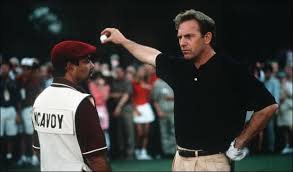In my league this week I shot double my handicap, which in my case is an extra 10 strokes for nine holes. I was playing against a guy named Reese, who happened to shoot under his handicap, which was a 3 already. In real terms, he shot a 37 and I shot a 55. I lost. More than losing though, is I lost a chance to learn. You see, part of my problem was the long grass that has grown since my last round. When I got in it, I never cleanly hit my ball out, and one time it took me 3 swings to move it 40 feet to regular grass. Reese got into the same grass and knew how to hit the ball cleanly towards the hole, and one shot traveled over 100 yards and landed within 10 feet of the hole.
My loss was not in the score, but in the anger and frustration that just made me swing harder. Ironically it was 12 hours after the round ended that it dawned on me – why didn’t I just ask Reese for some tips on how to hit out of that grass? He and his father were both great golfers and nice guys, and I am sure he would have given me some pointers because I will be back in that stuff next week, guaranteed. 🙂 My EGO got in the way.
Has your EGO ever put you in a position where you just ‘swing harder’ or maybe just stopped participating?
In my book, People-Centered Performance, I call misaligned ego as the number one threat to people-centered leadership. Ego, by itself, is actually a necessary ingredient for leaders. Merriam-Webster defines ego as “the opinion that you have about yourself.” As a leader, it gives you confidence and helps you recover quickly from mistakes. Here is what I wrote about the conditions that make ego get negative:
Ego is most at risk when we are in the midst of disorienting change. When change is too much, too fast, our self-perception is challenged by the unfamiliar landscape. Anytime our ego is at odds with reality, we are vulnerable.
Back to my golf game, I wrote these words but did not live by them. You see, I am not a great golfer and if I am faced with changing conditions I will shoot a higher score until I figure out how to change how I play. Historically it is the next round. 🙂 My misaligned ego kept me from adjusting. It kept me from asking for help.
Where is your ego misaligned?
- Is a peer offering input that you are dismissing because you have more experience?
- Are you managing people that are experts in their work and you spend time getting in the minutia of their work vs aligning their efforts with bigger organizational goals and removing barriers they are encountering?
- Are you working for someone younger or less experienced than you are and find yourself thinking ‘What an idiot’ or ‘Who are they to tell me what to do?’ everytime they open their mouth in a meeting?
As I look back on my coaching work over the last year I have seen this over and over. It can be an expensive leadership lesson if not corrected quickly – Your best people leave. Your bonus is lower. A promotion goes to someone else. You lose your job.
Tip: Spend a week looking for situations or people that trigger you into going into EGO overdrive. If you are not sure ask your spouse or close friend and they will tell you. Next time you find yourself in that situation or with that person, here are three questions to get out of the heather:
- What outcome is important here?
- Who can help me achieve this?
- Am I ready to ask for their help? (then ask)
Listen . . Lead. Repeat often!

